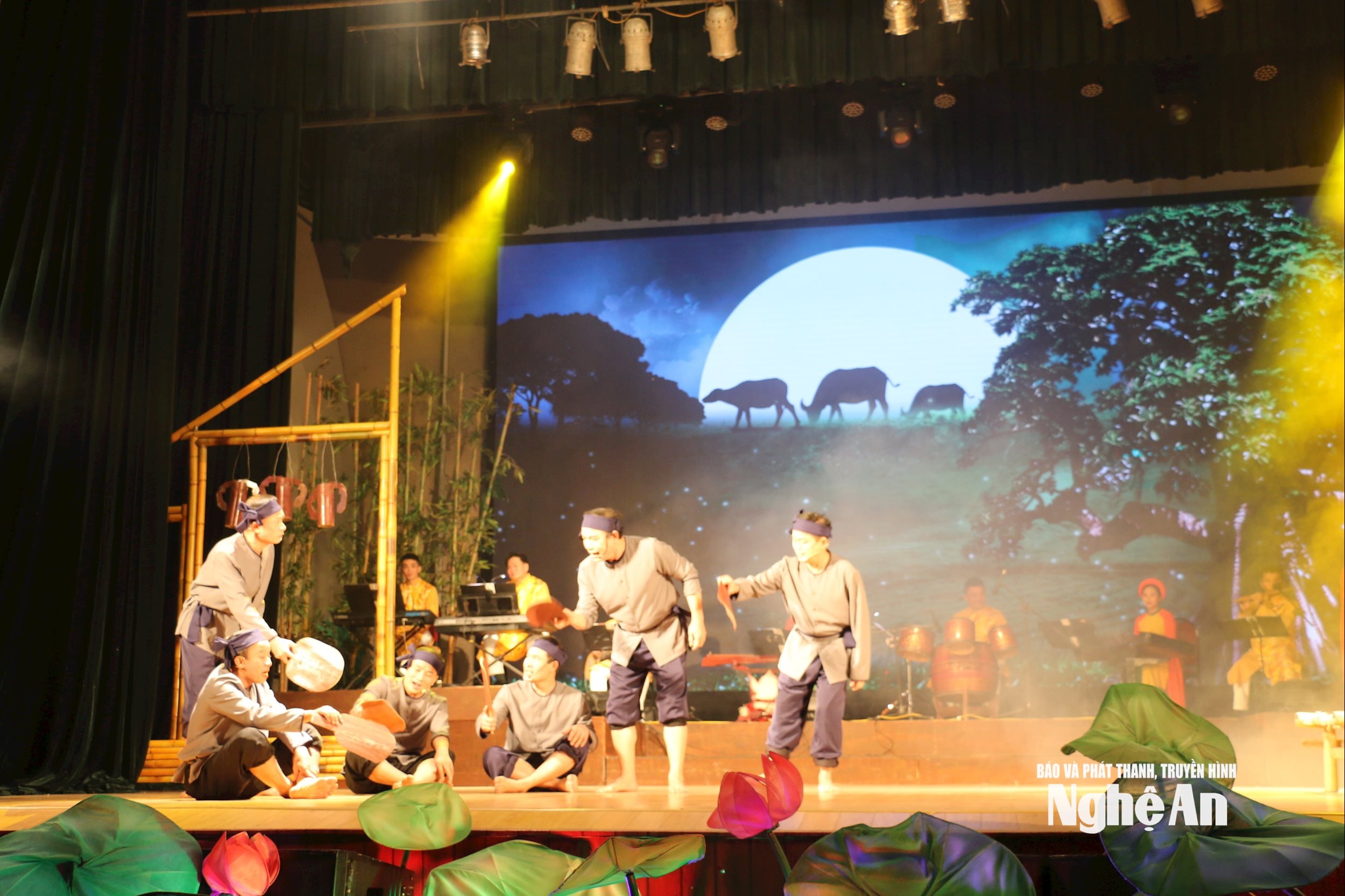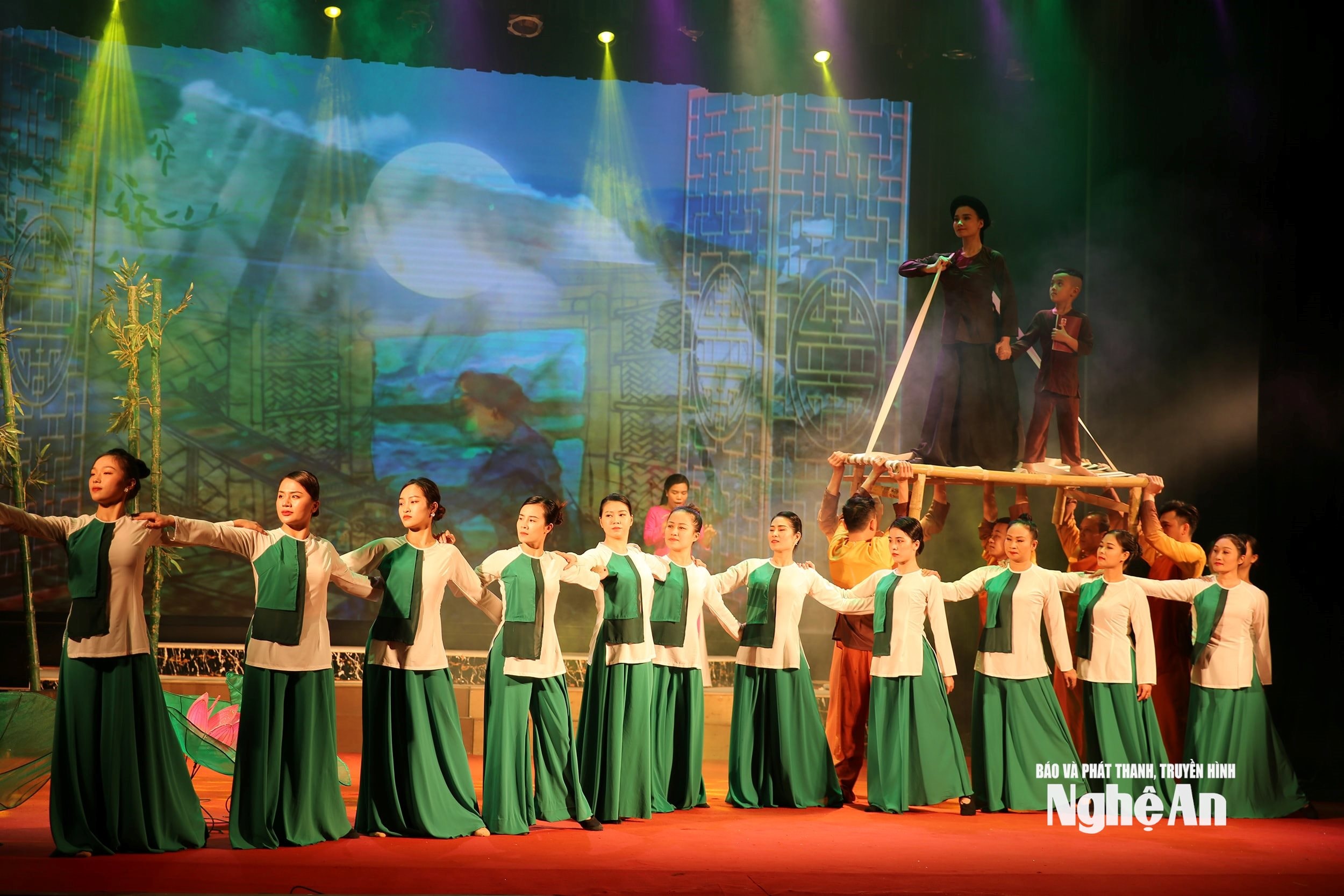Preserving the "soul" of Nghe dialect on the theater stage
On the brightly lit stages, Nghe Tinh folk songs still resound, sometimes deeply lyrical, sometimes lively and witty. But hidden behind each verse and each verse is a silent struggle: Should we preserve the Nghe dialect - the language that nurtured those melodies, or should we "popularize" it to suit the audience of the whole country?
LanguageArt on the professional stage
In the course of more than 60 years, Nghe Tinh Drama Theatre has staged nearly 200 plays, bringing Vi and Giam folk songs out of the rustic working space to step onto professional stages. Works such as:Mai Thuc Loan, The Girl of Lam River, Phan Boi Chau…not only carries the strong folk melody but also clearly preserves the Nghe accent - the quality that has created the unique identity of this land. However, in recent years, that accent seems to be gradually disappearing from the stage.

From the “purely Nghe” dialogues such as “mo, te, rang, rua, cho, nac”, the plays gradually changed to the smooth, easy-to-listen Mandarin. Except for a few excerpts performed locally, most of the plays participating in the national festival were:Power and Crime, Waves Rise Up in a Countryside… almost no trace of dialect remains. The reason is easy to understand: Audiences from other regions will find it difficult to follow if they are not familiar with Nghe dialect. But the price to pay is the fading of identity - the thing that originally makes up the soul of Vi and Giam folk songs.

Nghe An dialect is not just a language of communication. It is the “original material” that gave birth to folk songs, creating their own rhythm, tempo, and nuances. In hat giam, typical repetitive structures such as“It's not as bad as anything else / It's not as bad as anything else”or the charming wordplay in the fabric guild singing“Because his brother was foolish, he saw something sour and he was so jealous…”are all based on rich local vocabulary. Those layers of folk words are not individual creations but crystallizations of life, reflecting the soul and character of the Nghe people: simple, straightforward, frank but full of emotion.
Therefore, when removing dialect from the opera, not only does it lose its distinctive timbre, but it also takes away the "Nghe spirit" that permeates every song and every line. Many researchers have recalled the story of Ho Chi Minh when he visited his hometown and heard the song sung.“My boat goes up and down rapids / Mountains and rivers are the meaning of love, oh my”corrected: It should be sung as “nac” not “nuoc”, “ngai” not “nghia” - because that is the correct Nghe accent, the correct Nghe spirit. Just one tone is enough to identify a cultural region, let alone a whole system of lyrics and melodies.
Balancing conservation and integration
Meritorious Artist Hong Duong - Head of Research and Collection Department, Provincial Traditional Arts Center said: For a Nghe Tinh Folk Songs play to have a strong vitality, it is necessary to maintain its identity, showing the preservation and maintenance of our ancestors' ancient heritage. But there also needs to be a way to dilute the dialect so that listeners in the South and the North can quickly and clearly feel the beauty of Nghe Tinh Folk Songs on the stage of the play.
According to Meritorious Artist Hong Duong, for audiences from the North or the South, listening to Nghe dialect is sometimes a challenge: They need time to get used to it, to "absorb" it, but it is difficult to understand it thoroughly the first time. Therefore, some directors have chosen the solution of "diluting" the dialect, reducing the Nghe quality to increase its popularity. However, this solution, if extreme, can cause Nghe Tinh opera to lose its uniqueness, becoming similar to other types of theater.
In reality, the use of dialects is not necessarily an “either/or” situation. What is needed is moderation, selection, and placement in the right place at the right time. Plays can completely harmonize popular dialogue and dialect songs, between the strong Nghe accent and the gentle popular accent, as long as the soul is still preserved. Nghe accent can be “fine-tuned” like the current Vinh accent, which is still distinctive but not too heavy. Some overly specific words can be converted to popular words, but it is still necessary to retain “identifying signals” such as mo, te, rang, rua… so that listeners can still recognize the Nghe quality in them.

In addition, it is necessary to boldly exploit the treasure trove of folk language - idioms, proverbs, folk songs, riddles, verses... that have nurtured Nghe Tinh folk songs for generations. As Meritorious Artist Thanh Luu - former Director of the Center for Conservation of Nghe An Folk Song Heritage, now the Provincial Traditional Arts Center, said: Putting insinuations, sarcasm, humor... into the dialogue will make the play lively and close, avoiding the dryness of books. Along with that, it is necessary to connect dialects with local cultural elements such as place names, traditional occupations, and specialty products to create the atmosphere of Nghe An life on stage. That is the way to both preserve identity and create new appeal.

Especially in the context of digital technology and strong cultural exchange, folk music theater needs to innovate in form while still maintaining its core. It is possible to modernize sound, light, staging techniques, and incorporate contemporary topics such as education, environment, urbanization, etc. into the script. But no matter how much innovation there is, the Nghe dialect should still be present like a red thread throughout, so that viewers, no matter where they are, can recognize "Ah, this is Nghe Tinh theater".
After all, the stage is not only for entertainment but also a place to preserve the cultural memories of a community. Each dialect tone that resounds on stage is not just a dialogue or a song, but an echo of generations of hard-working, resilient Nghe An people. Without that voice, folk opera will lose its soul and become an empty shell.
For over 6 decades, Nghe Tinh folk songs have lived and shone on stages across the country not only thanks to the sweet Vi and Giam melodies but also thanks to the native accent. Preserving the dialect in folk drama is therefore not only preserving a layer of language, but also preserving the soul of Nghe - so that each song and dialogue is still imbued with the soul of the homeland, imbued with human love, remaining forever in the hearts of the public today and tomorrow.



